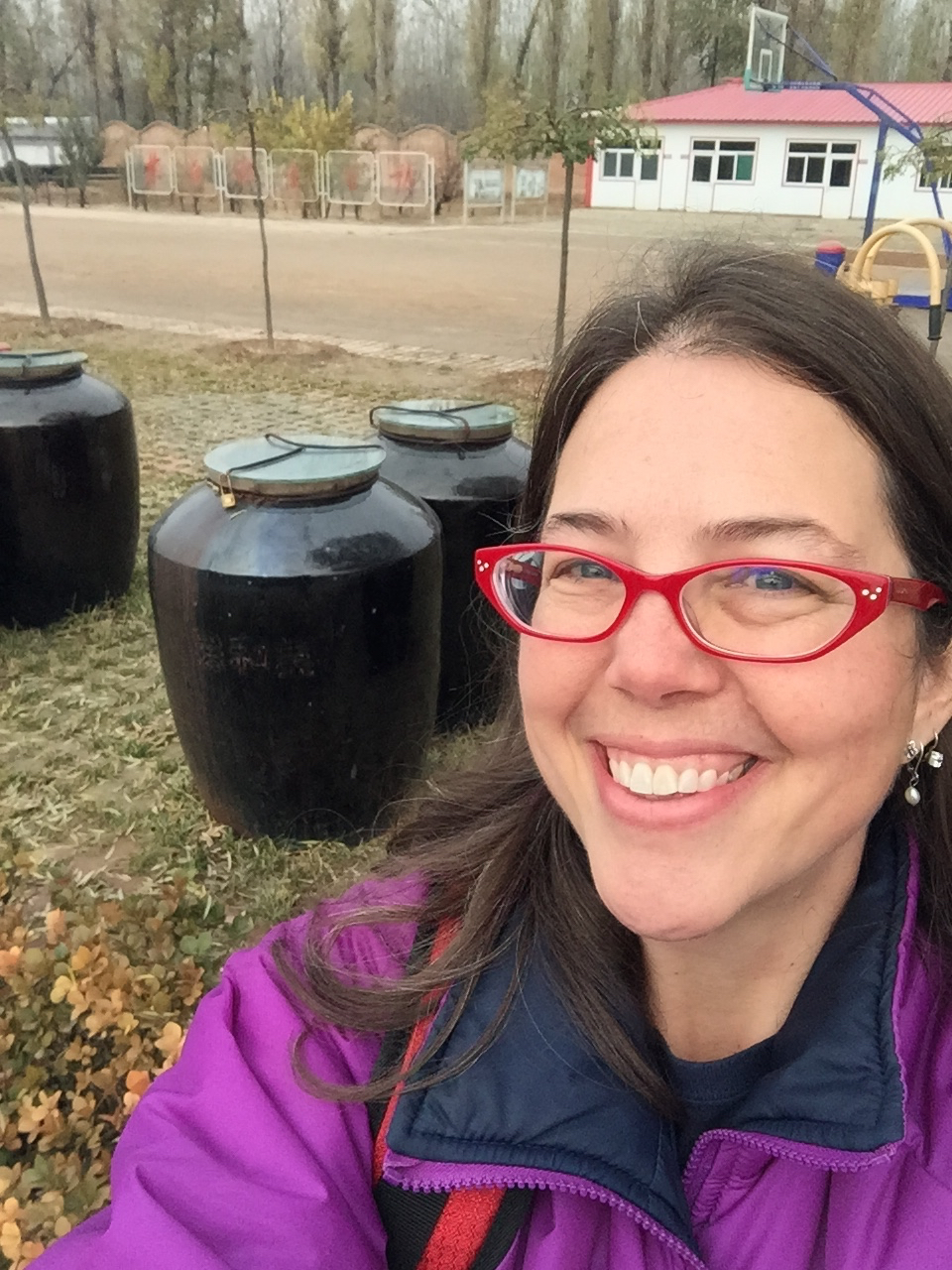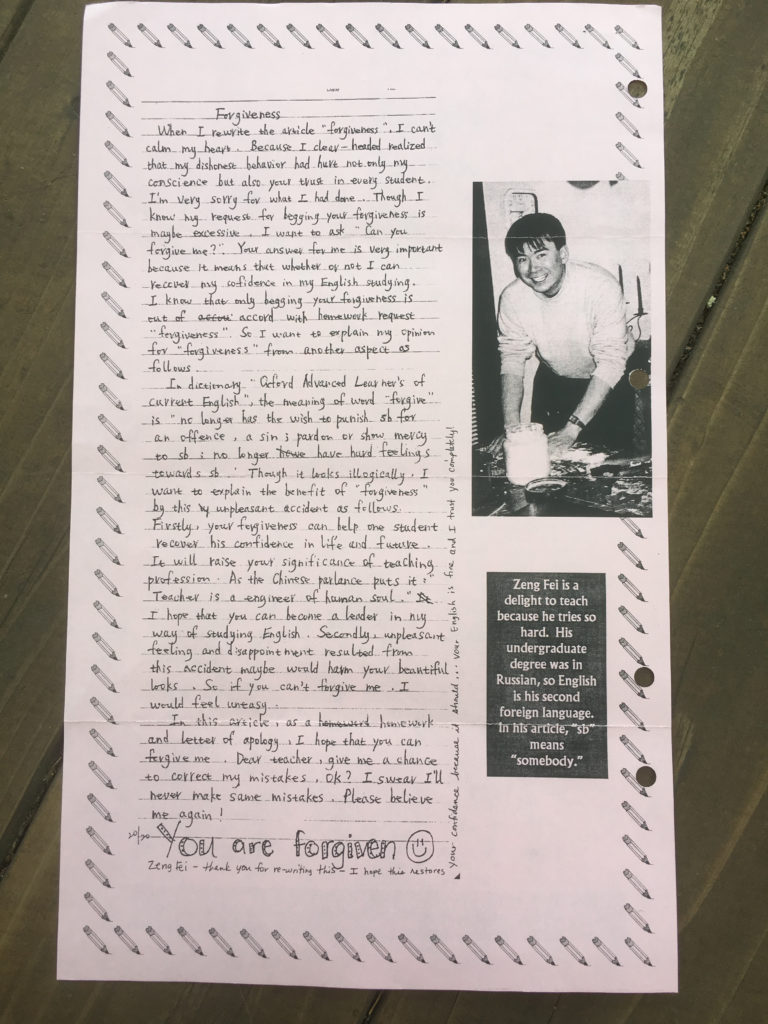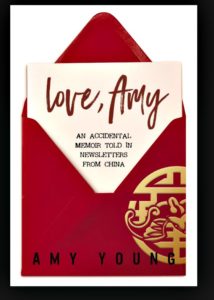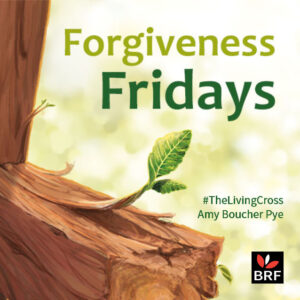Forgiveness Fridays: When forgiveness might be easy to overlook by Amy Young
What a thought-provoking post from Amy Young. When is a wrong not a wrong? What cultural trappings inform us as we answer that question? Just when do we need to forgive?
China could be called the “Knock-Off Capital” of the world. Knock-offs aren’t just for handbags, though in the classroom they go by another name: plagiarism. What I might call cheating is often classified as helping or good writing. I used to see this issue in black and white, saying that either helping or good writing (aka copying) were clearly cheating. But the longer I was in China, the more I understood the line wasn’t as clear as I thought.

Amy in China, next to vats of vinegar!
In a society where relationships are incredibly important, if your friend asks for help and you refuse them, you have no idea what future door you have closed. Maybe that friend’s father’s sister’s husband could have helped you move your mom to Beijing. Maybe not. But without helping, that person is not indebted to you.
In terms of copying being good writing, this used to be where I, as an American, would roll my eyes and say, “Whatever! A good writer is one who can use their own words.” But in China, a good writer is one who has read extensively and is able to incorporate others’ words into their own writing. Chinese writing is laden with proverbs and set phrases. Everyone knows that a good writer uses others’ words; it is not considered cheating, but a sign of being educated.
Because I’ve grown in my understanding of both reasons, I am able to be a better teacher and explain that when writing in Chinese, using other people’s words is exactly what the students should do. But when writing in English, they need to operate under different cultural norms. My students are consistently surprised when I can tell they haven’t written something themselves and want to know how I know. Several years ago I had two students hand in the exact same paper on the topic of forgiveness. I couldn’t tell who had copied whom so I gave them both a zero.
To make the point that copying wasn’t going to get by me and that I do read and remember what students write, I had a student stand at the front of the class and begin to read from one of the homework papers. As she was reading, I joined in reading the other paper. Of course, the class noticed they were . . . exactly the same. Point made. Since it was the first time plagiarism had occurred, I told the class the two students could rewrite their papers, but they had now all been warned and any future copying would receive a zero. The last laugh was on me because neither student copied off of the other; instead they both chose the same paper from the Internet to copy! Ha.
 Zeng Fei, who did an undergraduate degree in Russian, wrote the following letter to me in response.
Zeng Fei, who did an undergraduate degree in Russian, wrote the following letter to me in response.
When I rewrite the article entitled “Forgiveness,” I can’t calm my heart. Because I clear-headed realized that my dishonest behavior has hurt not only my content but also your trust in every student. I’m very sorry for what I have done. Though I know my request for begging your forgiveness is maybe excessive, I want to ask, ”Can you forgive me?” Your answer for me is very important because it means that whether or not I can recover my self-confidence in my English studying.
In the Oxford Advanced Learners Dictionary of English, the meaning of the word ”forgive” is “no longer has the wish to punish somebody for an offense, a sin; pardon or show mercy to somebody; no longer have hard feelings towards somebody.” Though it looks illogical, I want to explain the benefit of ”forgiveness” by this unpleasant accident as follows. Firstly, your forgiveness can help one student recover his confidence in life and future. It will raise your significance of teaching profession. As the Chinese parlance puts it “A teacher is an engineer of the human soul.” I hope that you can become a leader in my way of studying English. Secondly, unpleasant feeling and disappointment resulted from this accident maybe would harm your beautiful looks. So if you can’t forgive me I would feel uneasy.
In this article, as a homework and letter of apology, I hope that you can forgive me. Dear teacher, give me a chance to correct my mistakes, okay? I swear I’ll never make same mistakes. Please believe me again! Yours Zeng Fei.
Some people make it easy to forgive them, don’t they? I forgave him. By making it easy, I can miss that forgiveness is just as powerful whether is it so-called easy or hard. The guest posts in this series have tackled some deep wounds and shown the balm of forgiveness. For their words and the Lord’s forgiveness I am grateful. It’s been years since I taught Zeng Fei, I don’t know what became of him after he left my classroom. But I do know this, forgiveness changes people. How do I know this? I am one who is forgiven on the big, but equally important, the small.
Where has a “small” act of forgiveness made a big difference in your life?
 Amy Young is an avid Denver Broncos fan and knows what it’s like to learn lessons of forgiveness on foreign soil. You can read more of her work at The Messy Middle and receive a 14 tips to live well in a messy world. She is the author of Looming Transitions and Love, Amy: An Accidental Memoir Told in Newsletters from China.
Amy Young is an avid Denver Broncos fan and knows what it’s like to learn lessons of forgiveness on foreign soil. You can read more of her work at The Messy Middle and receive a 14 tips to live well in a messy world. She is the author of Looming Transitions and Love, Amy: An Accidental Memoir Told in Newsletters from China.








 Hello!
Hello! 